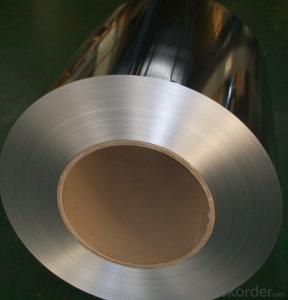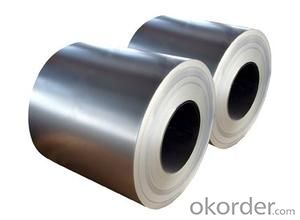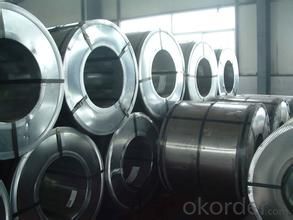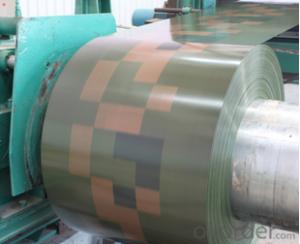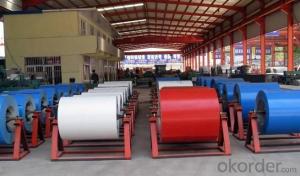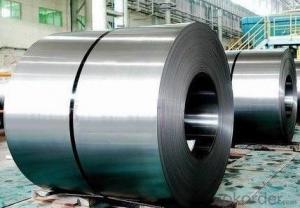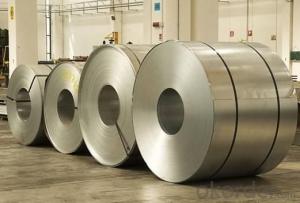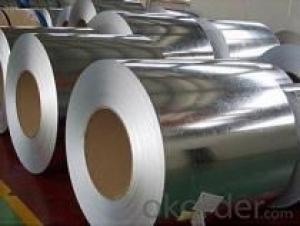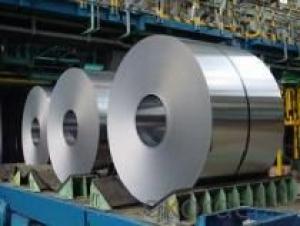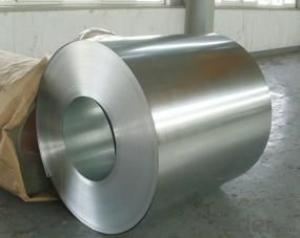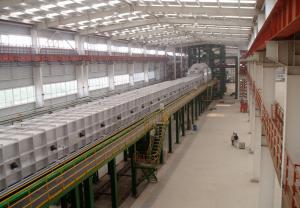Galvanized Steel Strips for Galvanized Steel Pipe (ERW) in Building, Furniture
- Loading Port:
- Shanghai
- Payment Terms:
- TT or LC
- Min Order Qty:
- 25 m.t.
- Supply Capability:
- 10000 m.t./month
OKorder Service Pledge
OKorder Financial Service
You Might Also Like
Introduction
Hot roll base hot-dip galvanized steel coil (HGI)
Cold roll base hot-dip galvanized steel coil (CGI)
The continual hot roll steel coil is made into galvanized steel coil by means of passing through the molten zinc pot. The coating on the product surface is characterized by its uniformity, tightness, erosion resistance and pressure resistance. In addition, the strength of the welding seam is satisfied. The product is widely applied in industries such as construction, home electrical appliance, automotive and machine, etc.
Description
Grade: Q195,DX51D+Z;
Standard: JIS G 3302, EN10327, ASTM A653, GB 2518;
Thickness: 0.24mm – 2.5mm; Width:30-1250mm; Coil ID: 508mm;
Process of Cold Rolled Steel Tape: Rolling-Annealing-Dip Coating-Straightening-Coiling
Specifications
High durable in different environment
Best quality for anti-corruption
Easy for operation
Application
With excellent cold bending molded manufacturablity, good decoration effect, strong anti-corrosion ability, galvanized steel coils and sheets are also pollution-free and easily recycled. Accordingly, they can be used as final products and basic plates of color coated steel coils and widely applied in construction, home appliances,decoration, ect.
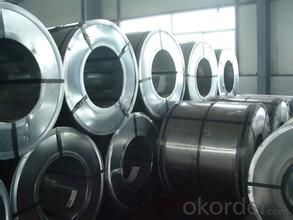
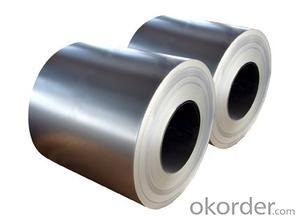
- Q: How are steel coils used in the production of steel fasteners?
- Steel coils are used in the production of steel fasteners as they serve as the raw material for manufacturing various types of fasteners such as screws, bolts, nuts, and washers. The steel coils are unwound and then processed through machinery that cuts, shapes, and forms them into the desired fastener shape. This allows for efficient and precise production of steel fasteners, ensuring their strength, durability, and compatibility with various applications.
- Q: I want to design and fab a steel helmet like that in the latest Batman cartoon movie. Only problem I can foresee is staining the metal red.
- How To Stain Steel
- Q: The guy at this one pawn shop told me that stainless steel is better because it is just as strong and will not rust. The guy at the other pawn shop said that you need high carbon steel for a good sword because stainless steel breaks easily and that damascis is the best kind of steel for swords.
- You are gonna want carbon steel. Most real swords are always made from carbon steel. The vast majority of cheap swords being sold online are made from stainless steel. While stainless steel is a great choice for knives, it starts becoming very brittle on anything longer than 12? and is NOT a suitable material for a functional sword, no matter what some marketers might claim?. Stainless steel when it comes to a functioning weapon, is a joke. It's not made to cut and it's not made to last.
- Q: Is steel with a black coloring as strong as regular steel. if you are asking why i have two wordsBlack Katana.I know a katana is not made with normal steel, it is made of two types with varying grades of carbon to give it speacial properties, i just want to know if the black will make a difference.
- The term tensile potential refers back to the quantity of tensile (stretching) rigidity a textile can stand up to in the previous breaking or failing. the in simple terms suitable tensile potential of a textile is calculated by making use of dividing the element of the textile examined (the pass area) by making use of the strain located on the textile, regularly expressed in terms of pounds or much consistent with sq. inch of fabric. Tensile potential is an considerable degree of a textile's skill to accomplish in an utility, and the scale is extensively used whilst describing the residences of metals and alloys.
- Q: looking to buy a sashimi knife. what is the difference between white steel (1and2) and blue steel (1and2) in terms on characteristics. what gets sharper? what holds edge longer? basically any info on the pros and cons of each steel would be SO GREATLY APPRECIATED! thanks in advance to all who answer. i'm leaning towards white-2 steel for my first sashimi knife, started training on the sushi bar and need a new tool!
- This Site Might Help You. RE: what is the difference between white steel and blue steel in reference to sushi knives? looking to buy a sashimi knife. what is the difference between white steel (1and2) and blue steel (1and2) in terms on characteristics. what gets sharper? what holds edge longer? basically any info on the pros and cons of each steel would be SO GREATLY APPRECIATED! thanks in advance to all who...
- Q: What are the different methods of corrosion protection for steel coils?
- Steel coils can be protected from corrosion using several different methods, each with its own advantages and disadvantages. One commonly used method is to apply a protective coating to the steel coils. This can be done through various techniques like hot-dip galvanizing, electroplating, or painting. Coatings act as a barrier between the steel surface and the corrosive environment, preventing direct contact and reducing the risk of corrosion. Another option is the use of VCI materials, which release chemicals that inhibit corrosion when they come into contact with the steel surface. These materials can be applied as coatings, films, or papers, and are particularly useful for long-term storage or shipping of steel coils. Cathodic protection is a method that involves the use of sacrificial anodes or impressed currents. Sacrificial anodes, made of zinc or aluminum, are connected to the steel surface and corrode instead of the steel, sacrificing themselves to protect the coils. Impressed current systems use a direct electrical current to prevent corrosion on the steel surface. Proper wrapping and packaging can also provide corrosion protection for steel coils. This includes using moisture barrier films, desiccants, or absorbent materials to reduce moisture content. Adequate ventilation and avoiding contact with other corrosive substances are also important. Controlling the environment in which the steel coils are stored or used is crucial for corrosion protection. This involves maintaining proper humidity levels, controlling temperature, and managing air quality. By minimizing exposure to corrosive elements like moisture, salts, or chemicals, the risk of corrosion can be significantly reduced. It's worth noting that the choice of corrosion protection method depends on factors such as the specific application, budget constraints, and desired lifespan of the steel coils. A combination of these methods may also be used to enhance corrosion protection.
- Q: How are steel coils used in the manufacturing of consumer goods?
- Steel coils are used in the manufacturing of consumer goods as a primary material for various products. The coils are typically processed and transformed into different shapes, such as sheets, strips, or wires, which are then used to create a wide range of items like appliances, furniture, automotive components, and construction materials. The durability and strength of steel make it an ideal choice for consumer goods, ensuring long-lasting and reliable products for consumers.
- Q: What is the role of steel coils in the production of fencing materials?
- Steel coils play a crucial role in the production of fencing materials as they serve as the primary raw material for manufacturing various types of fences. These coils are typically uncoiled, cut, and shaped into individual fence components, such as posts, rails, and pickets. The strength and durability of the steel make it an ideal material for fencing, ensuring that the final product can withstand harsh weather conditions and provide security for a long time.
- Q: What kind of insulation should be used in a steel building?
- Fiberglass batts or spray on foam both work well
- Q: How are steel coils inspected for elongation?
- Steel coils are inspected for elongation using a variety of methods. One common method is the use of a tensile testing machine. In this method, a small sample is taken from the steel coil and placed into the machine. The machine then applies a pulling force to the sample until it breaks. The amount of force required to break the sample is measured, and this information is used to determine the elongation of the steel coil. Another method used to inspect steel coils for elongation is the use of ultrasonic testing. In this method, high-frequency sound waves are passed through the steel coil. By analyzing the reflection of these sound waves, it is possible to determine the elongation and other properties of the steel coil. Visual inspection is also an important aspect of inspecting steel coils for elongation. Trained technicians visually inspect the steel coils for any signs of stretching or deformation that may indicate excessive elongation. Overall, a combination of mechanical testing, ultrasonic testing, and visual inspection is used to thoroughly inspect steel coils for elongation and ensure their quality and compliance with industry standards.
Send your message to us
Galvanized Steel Strips for Galvanized Steel Pipe (ERW) in Building, Furniture
- Loading Port:
- Shanghai
- Payment Terms:
- TT or LC
- Min Order Qty:
- 25 m.t.
- Supply Capability:
- 10000 m.t./month
OKorder Service Pledge
OKorder Financial Service
Similar products
Hot products
Hot Searches
Related keywords
